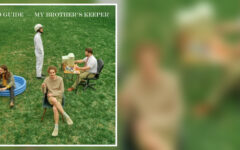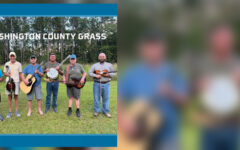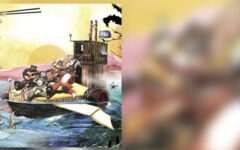
It’s a little early in the year to be making album of the year lists, but I can just about guarantee that once awards season rolls around, Industrial Strength Bluegrass will be a top contender. The Joe Mullins-produced effort from Smithsonian Folkways chronicles the booming bluegrass scene in southwestern Ohio in the early days of the genre. While doing so, it also creates one of the biggest all-star collaborations in recent years, drawing from bluegrass, country, and Gospel artists to truly hit it out of the park.
Many readers will have heard the album’s first single and opening track, Readin’, Rightin’, Route 23, which Joe Mullins and the Radio Ramblers premiered during last year’s IBMA Awards, and was released to radio earlier this year. Written and originally recorded by country artist Dwight Yoakam, it serves as a theme song of sorts for the album, relating the tale of the thousands of folks who made their way up the “hillbilly highway,” US Highway 23, from rural Appalachia to the industrial areas of southern Ohio. It’s a catchy, solid number (and a perfect fit for Mullins’s vocals), guided by Joe’s banjo and resophonic guitar from guest Jerry Douglas.
The rest of the album is a mixture of classic bluegrass hits and standards, and some more obscure numbers from smaller, regionally-based groups. One that will have everyone singing along is Dan Tyminski’s cut of 20/20 Vision, the album’s tribute to Jimmy Martin and the Osbore Brothers, who spent much of their early careers in and around Dayton, Ohio. Tyminski doesn’t necessarily add anything new to the song, but does he need to? It’s always great to hear Tyminski sing straightforward, traditional grass, and Glen Duncan’s fiddles are spot on. Another fine traditional track is The Stanley Brothers’ Stone Walls and Steel Bars, featuring the excellent trio of Ronnie Bowman, Don Rigsby, and Kenny Smith. Bowman was a great choice to sing lead here; there’s plenty of lonesome in every note.
There are few artists I like and respect more than Larry Sparks, and the album offers a nice homage to him through a medley of some of his classic hits – Dark Hollow, A Face in the Crowd, and These Old Blues. Personally, I might have included Blue Virginia Blues or John Deere Tractor, but it’s really almost impossible to narrow down the best or most representative Larry Sparks songs. Josh Williams takes the lead on a bouncy Dark Hollow, Bradley Walker tackles A Face in the Crowd (capturing some of Sparks’s inflections), and Russell Moore tears into These Old Blues with vigor. The band on this track is hot, with particular note given to Mullins’s banjo, David Harvey’s mandolin, and guitar from Kenny Smith and Williams.
The album includes several Gospel tracks, of which the best might be Doyle Lawson & Quicksilver’s version of When He Blessed My Soul. Lawson leads a quartet including Jerry Cole (tenor), Eli Johnston (baritone), and Matt Flake (a wonderful bass). Lawson’s arrangement is bright and joyful, honoring the Brown’s Ferry Four’s contributions to Gospel music. Family Reunion, recorded as a duet between Caleb Daugherty and Rhonda Vincent, is another fine number. Daugherty and Vincent offer a heartfelt, country-leaning reading of the song, and Brent Burke’s resophonic guitar is top-notch.
Mo Pitney and Merle Monroe tackle Harley Allen’s Suzanne. Though the original from Allen and Mike Lilly is hard to beat, Pitney’s earnest lead accompanied by Tim Raybon’s high harmony will likely be a repeat listen for most fans. Vince Gill reminds us all of his bluegrass cred with a swingy Baby Blue Eyes, doing Lester Flatt proud. Some listeners may wonder why Flatt and Scruggs are included on an album honoring southwestern Ohio, but some of their earliest recordings after leaving Bill Monroe were made in Cincinnati – including Baby Blue Eyes, the first song they recorded there.
Mullins’s care in arranging this album becomes evident with the final song – Bobby Osborne performing the Boys from Indiana’s We’ll Head Back to Harlan. With this cut, the album seems to come full circle, as the homesick hillbilly from Readin’, Rightin’, Route 23 finally decides to head back to Kentucky. There are very few of the artists honored on this album that are still performing – or even still living – so Bobby Osborne was a fitting choice to lead this song. He lived the life spoken of in the opening and closing songs himself, and fills the song with heart and conviction.
I could probably talk about this album, the artists it pays tribute to, and the artists who perform on it, for days. This right here is the kind of music I grew up listening to, and what I still prefer personally today. But I’ll stop, and let you buy the album and enjoy the rest on your own – with the help of the meticulously detailed and researched liner notes, mostly penned by Daniel Mullins. Kudos to all those involved for truly capturing the spirit of bluegrass music on this album.
For more information on this album, visit Smithsonian Folkways online. The album is available from a variety of online music retailers.







